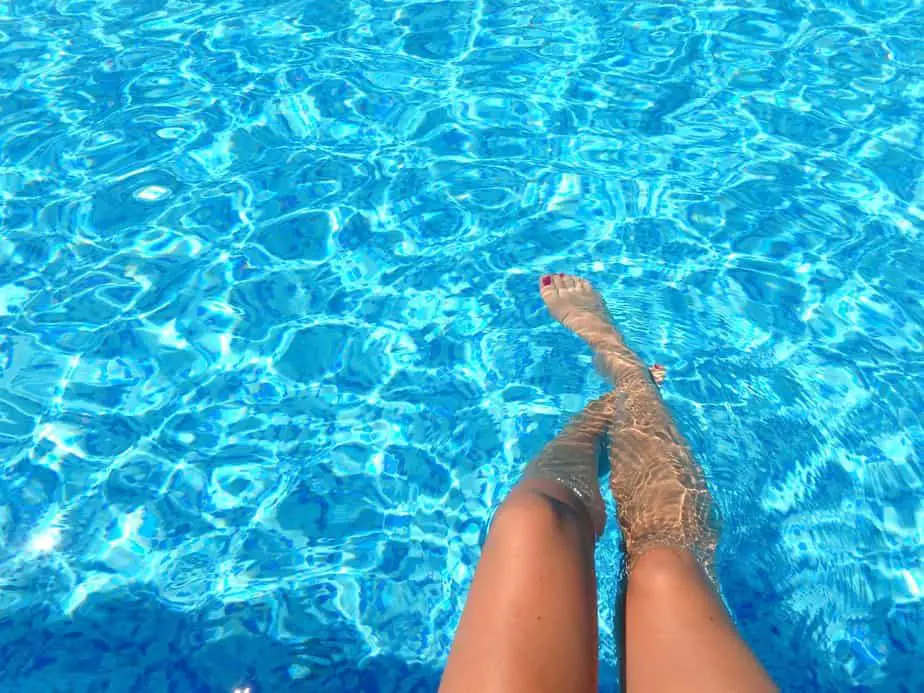If your pool water is a little bit on the chilly side, you could heat it up with an electric or gas heater, but they are a hassle to install and expensive. So what better way to heat up a pool than to let the sun do it for free? The only problem is, it’s not as efficient as a proper heater and can take a long time to heat up your pool.
Naturally, you may have many questions about this process. How long does it take for a pool to heat up by the sun? Is there a way to speed this process up? How does it compare to an electric or gas heater? Is it even worth the effort?
In this article, we will answer all of these questions in more detail to help you make an informed decision.
Can the sun actually heat up a pool?

Yes, the sun can increase the pool temperature by a noticeable amount. The time it takes for that to happen, however, can vary greatly depending on various factors such as outdoor temperature, time of day, pool size, etc, all of which I discuss in greater detail below.
On average, it should take about 8-12 hours for you to notice an increase in pool temperature. That’s about the time it takes for all of the water in your pool to circulate fully, during which the sun can increase the water temperature by 2 to 5°F each cycle.
After several days in a row of sunny weather, your pool temperature can increase by as much as 5 to 15°F.
It is important to keep the pool pump running so that the sun can heat all of the water in the pool. You also have to consider the heat loss that can occur at night due to the lower temperatures.
If you want your pool to preserve its heat until the next day, you will need a solar cover to retain as much heat as possible. In fact, you should keep the solar cover on during the day to speed up the process by as much as 8 times compared to without a cover. Without one, all of the heat gained during the day will be lost, so a solar cover is essential.
Top factors that affect solar heating

How effective the sun is at heating your pool depends on a few important factors. They are:
- Pool size: How much water is in your pool, which is a function of the size of your pool, will greatly affect how long it takes for the sun to heat it up. Naturally, the bigger your pool, the longer this process takes and vice versa.
- Starting water temperature: If the water temperature was already cold to begin with, such as after leaving it out for the night uncovered, then it’s going to take longer for the sun to heat the pool.
- Ambient temperature: How warm the weather is that day will help the water reach a higher temperature faster. For instance, a pool will heat up more when it’s over a hundred degrees out compared to only 85 degrees.
- Heat loss: After your pool is warmed up over the course of the day, you need to retain the temperature, otherwise there will be significant heat loss once the sun sets, and your pool will get cold again by the next day. You can reduce heat loss by covering your pool with a solar cover. If your pool has dark interior lining, that will absorb heat more efficiently.
- Outside weather condition: Related to the ambient temperature; if it’s cloudy, rainy, or windy outside, these conditions will reduce the temperature and make it impossible for your pool to get heated up by the sun.
- Sunlight angle: The direction of the sun’s rays can affect how quickly your pool heats up. When the sun is directly overhead in the afternoon, that is when the sun’s rays are at their most effective. When the rays are shining from a shallow angle, such as early morning or in the evening, then they are less effective.
Ways to heat your pool faster with the sun

Do you feel that waiting 8-12 hours is too long? I think so too. Plus, any increase in water temperature over the course of the day is lost at night, and you have to wait until several hours the next day for the sun to heat your pool up. This is too slow. Here’s how you can speed it up.
- Install a solar cover: Solar pool covers are designed to not only cover your pool, keeping debris out, but also for letting sunlight through and trapping heat. This helps water retain the heat over the course of the night when temperatures drop. The cover also keeps water from evaporating, particularly on windy days. A black solar cover is essential if you want to make use of the sun to heat your pool.
- Let as much sunlight in: Try to let as much sunlight reach your pool. Remove any obstacles that create shade over it. If you have an above-ground pool, position it in an area where the greatest amount of sunlight can reach it, e.g. away from trees or tall fences.
- Install dark interior lining: Darker colors absorb more sunlight compared to lighter colors. That is why it is said that dark clothing is much warmer than light or white clothing. Applying this logic to the pool, having black or darker lining will help it to absorb more heat which will heat your pool faster.
- Use solar rings: An alternative to using a solar cover is to use solar rings. These rings float along the surface of your pool and absorb heat which transfers to your water. Each ring can retain heat for a long time and does not cover the entire pool, unlike a solar cover.


